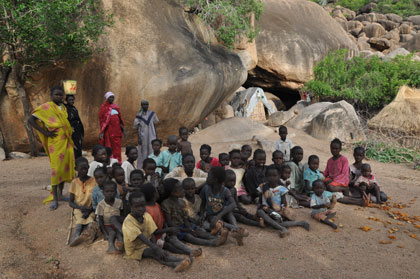
Today, Sudan’s Interior Minister Ibrahim Mahmoud Hamad takes the platform to speak on “Strengthening the Resilience of Communities” at the International Peace Institute in New York. In recent weeks, Hamad has himself challenged the resilience of the Sudanese people by supervising the government’s brutal repression of peaceful demonstrators, activists, press, and civil society organizations. Although hundreds were killed in the streets and at least a thousand remain detained by state security, Hamad, whose government shut down the internet for almost a day, still publicly claims that the grisly photos leaking out on social media are being recycled from the Egyptian revolution. Hamad’s responsibilities extend beyond the recent crackdown; he also handles negotiations on humanitarian access to civilians living in war-torn Darfur, South Kordofan and Blue Nile.
While Hamad gave his presentation in New York, at Enough, we made public the pressing humanitarian needs of civilians still living in rebel-held parts of Sudan’s South Kordofan state in our new report, “Life in the Nuba Mountains.” The facts in the report challenge Hamad’s narrative on the government’s efforts to promote and strengthen resilience. “For decades my people have been living off the land and providing for themselves despite drought and conflict,” says Rev. Andudu Adam Elnail, the bishop of Kadugli diocese
“Now they face bombings timed specifically so that they are prevented from planting their crops and tending their fields. Adults go hungry so that their children can eat. But many still continue to die from hunger and diseases. Thousands of children are living in caves in the mountains without education. People are living life under siege and in constant fear”
The “Life in the Nuba Mountains” report finds that households in the region are cultivating 73 percent less land than they were before the conflict erupted. These patterns amplify the recent findings of the Sudan Consortium, which tracked the timing of bombing attacks in both 2012 and 2013 and found evidence of a deliberate and ongoing intention to disrupt the planting and harvesting of food crops. Currently, in South Kordofan, 62% of adults are restricting their own food consumption so that children can eat. 43% of surveyed households do not even have enough food to last a week. Steven Hansch, an expert on humanitarian aid with Relief International, reviewed the report’s methodology and findings. He found “the researchers’ assessment techniques are consistent with international practice and the analysis covers hunger, water access, education, health care, displacement, sanitation issues — metrics that effectively capture a snapshot of life in the area.”
Since June 2011, the Sudanese government’s aerial bombardment campaign and armed conflict between Sudan Armed Forces (SAF) and the Sudan People’s Liberation Movement-North (SPLM-N) has severely disrupted the safety, health, and livelihoods of people across South Kordofan. Hundreds of thousands have fled across the border to neighboring South Sudan seeking refuge, but many remain on their land. At the same time, the Sudanese government has prohibited international aid workers from accessing rebel-held areas, even for a polio vaccination campaign for young children and babies.
As Enough’s Co-Founder John Prendergast explains:
"The Sudan regime continues to use the denial of humanitarian aid as a weapon of war. The result of this is a steady diminishing of the capacity of Nuba communities to cope with this imposed deprivation. It is a most cynical approach to warfare, slowly bleeding the people of their ability to survive. The international community must become more robust in its efforts to break this humanitarian blockade. Hundreds of thousands of Sudanese lives depend on it."
If Hamad truly wants to strengthen resilient communities across Sudan, his government should stop using aid as a weapon of war, halt its daily deliberate bombardments and immediately lift restrictions on access for humanitarian aid workers.

